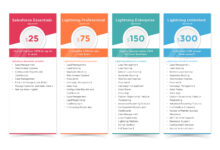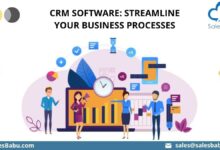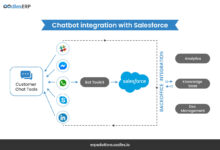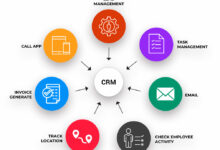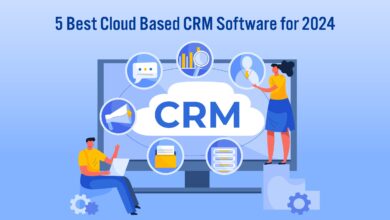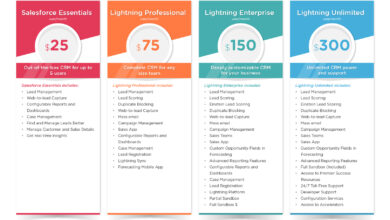AI-Powered CRM Software: Revolutionizing Customer Relationship Management
AI-Powered CRM Software is a cutting-edge technology that is reshaping the landscape of customer relationship management. Dive into this comprehensive guide to explore the impact and benefits of AI in revolutionizing CRM systems.
From defining AI-Powered CRM software to discussing key features, implementation strategies, personalization techniques, data security measures, integration with other business tools, industry applications, training requirements, performance metrics, and future trends, this guide covers it all.
Definition of AI-Powered CRM Software
AI-Powered CRM software refers to Customer Relationship Management systems that utilize artificial intelligence technologies to enhance and automate various aspects of customer interactions and data management. By integrating AI capabilities, CRM systems can analyze vast amounts of data, predict customer behavior, personalize marketing strategies, and streamline processes for improved efficiency.
Integration of Artificial Intelligence in CRM Systems
AI is integrated into CRM systems through machine learning algorithms, natural language processing, and predictive analytics. These technologies enable CRM platforms to automatically analyze customer data, identify patterns, and make intelligent recommendations to sales and marketing teams. By leveraging AI, CRM software can provide valuable insights into customer preferences, optimize lead management, and improve overall customer satisfaction.
Benefits of AI in Enhancing CRM Functionalities
- Personalized Customer Interactions: AI-Powered CRM software can analyze customer data to create personalized marketing campaigns, tailored product recommendations, and targeted communication strategies.
- Improved Sales Forecasting: By using predictive analytics, AI helps CRM systems forecast sales trends, identify potential leads, and prioritize opportunities for increased revenue generation.
- Enhanced Customer Support: AI enables CRM platforms to automate customer service processes, provide real-time assistance, and resolve issues efficiently through chatbots and virtual assistants.
- Optimized Data Management: AI automates data entry, cleansing, and organization within CRM systems, ensuring accurate and up-to-date information for better decision-making.
Key Features of AI-Powered CRM Software
AI-powered CRM software comes with a variety of key features that set it apart from traditional CRM solutions. These features leverage artificial intelligence to enhance customer relationship management in significant ways.
1. Advanced Automation
AI-powered CRM software offers advanced automation capabilities that streamline repetitive tasks, such as data entry, lead scoring, and email responses. This automation frees up valuable time for sales and marketing teams to focus on more strategic activities.
2. Predictive Analytics
One of the standout features of AI-powered CRM software is its ability to provide predictive analytics. By analyzing historical data and customer behaviors, AI can forecast trends, identify potential sales opportunities, and even predict customer churn. This valuable insight helps businesses make informed decisions and optimize their sales strategies.
3. Personalized Customer Interactions
AI-powered CRM software enables personalized customer interactions by analyzing vast amounts of customer data in real-time. By understanding customer preferences, purchase history, and behavior patterns, businesses can deliver tailored experiences that resonate with individual customers. This level of personalization leads to higher customer satisfaction and loyalty.
4. Natural Language Processing (NLP)
With the integration of natural language processing (NLP) capabilities, AI-powered CRM software can interpret and respond to customer inquiries and feedback. This feature allows businesses to engage with customers more effectively, providing timely and relevant responses to queries or concerns.
5. Intelligent Insights and Recommendations
AI-powered CRM software generates intelligent insights and recommendations based on data analysis. By identifying patterns and correlations within customer data, businesses can uncover hidden opportunities, optimize marketing campaigns, and improve overall customer engagement. These insights empower businesses to make data-driven decisions that drive growth and profitability.
Implementation of AI in CRM Systems
AI plays a crucial role in revolutionizing CRM systems by enhancing customer interactions and predictive analytics. By leveraging AI technologies, businesses can streamline processes and gain valuable insights to drive better customer relationships.
Examples of AI Implementation in CRM Systems
- AI-powered chatbots for instant customer support
- Automated lead scoring based on predictive analytics
- Personalized recommendations for cross-selling and upselling
- Sentiment analysis to understand customer emotions and preferences
Impact of AI on Automating Customer Interactions in CRM
AI automation in CRM systems enables businesses to provide efficient and personalized customer interactions at scale. By automating routine tasks such as data entry, lead qualification, and customer inquiries, AI frees up valuable time for sales and customer service teams to focus on high-value activities.
Role of Machine Learning in Predictive Analytics within CRM Software
Machine learning algorithms within CRM software analyze historical data to predict future customer behaviors and trends. By identifying patterns and correlations in data, machine learning enables businesses to make data-driven decisions and anticipate customer needs. This proactive approach empowers organizations to deliver personalized experiences and targeted marketing campaigns that drive customer engagement and loyalty.
Personalization and Customer Experience
Personalization and enhancing customer experience are crucial aspects of AI-powered CRM software. By leveraging AI, businesses can tailor interactions and marketing campaigns to meet the individual needs and preferences of customers, ultimately leading to improved engagement and loyalty.
Enhanced Customer Interactions
AI contributes to enhancing personalized customer experiences by analyzing customer data in real-time to provide relevant and timely recommendations or solutions. This level of personalization helps in creating a more engaging and satisfying customer journey.
Strategies for Improving Engagement
- Utilize AI algorithms to analyze customer behavior and preferences, allowing businesses to anticipate their needs and provide proactive support.
- Implement chatbots powered by AI to offer immediate assistance and personalized recommendations, enhancing the overall customer experience.
- Leverage AI-driven analytics to understand customer sentiment and feedback, enabling businesses to tailor their communication strategies accordingly.
Tailoring Marketing Campaigns
AI plays a crucial role in tailoring marketing campaigns based on customer behavior analysis. By analyzing data such as previous purchases, browsing history, and engagement patterns, businesses can create targeted campaigns that resonate with individual customers, leading to higher conversion rates and increased customer satisfaction.
Data Security and Privacy Measures
Data security is a critical aspect of AI-Powered CRM systems as they handle sensitive customer information. Ensuring the privacy and protection of this data is essential to maintain trust with customers and comply with data protection regulations.
Encryption and Secure Access
AI-Powered CRM software incorporates advanced encryption techniques to safeguard customer data. By encrypting data both at rest and in transit, sensitive information remains secure from unauthorized access. Access controls are also implemented to restrict data access to authorized personnel only.
- Data Encryption: AI tools like AES (Advanced Encryption Standard) are commonly used to encrypt data in CRM systems. This ensures that even if data is compromised, it remains indecipherable without the encryption key.
- Secure Access: Two-factor authentication and role-based access control are employed to ensure that only authorized users can view or modify customer data. This adds an extra layer of security to prevent unauthorized access.
Anonymization and Data Masking
To further protect customer privacy, AI-Powered CRM solutions utilize techniques like anonymization and data masking. These methods help in concealing sensitive information while still allowing for data analysis and insights.
- Anonymization: AI algorithms can anonymize data by removing personally identifiable information (PII) such as names, addresses, and contact details. This ensures that the data is not traceable back to individual customers.
- Data Masking: By masking certain parts of the data, such as credit card numbers or social security numbers, AI tools prevent unauthorized users from accessing sensitive information. This helps in maintaining data privacy and compliance with data protection laws.
Integration with Other Business Tools
AI-Powered CRM software offers seamless integration with a variety of other business tools, providing a more holistic approach to customer relationship management. This integration enhances overall efficiency, productivity, and decision-making processes within an organization.
Benefits of Seamless Integration
- Streamlined Data Management: Integration allows for the smooth flow of data between different platforms, eliminating the need for manual data entry and reducing errors.
- Enhanced Communication: By integrating CRM with communication tools like email and messaging platforms, teams can easily collaborate and communicate with customers.
- Improved Analytics: Integration with analytics tools enables businesses to gain deeper insights into customer behavior and preferences, leading to more targeted marketing strategies.
Popular Integrations
-
Integration with Marketing Automation Platforms:
CRM software can be integrated with marketing automation tools like HubSpot or Marketo to automate marketing campaigns based on customer data and interactions.
-
Integration with E-Commerce Platforms:
By integrating CRM with e-commerce platforms like Shopify or WooCommerce, businesses can track customer interactions and purchase history, enabling personalized marketing efforts.
-
Integration with Helpdesk Software:
CRM integration with helpdesk software such as Zendesk or Freshdesk allows for better customer support by providing agents with a comprehensive view of customer interactions and issues.
Industry Applications of AI-Powered CRM
AI-Powered CRM software has revolutionized customer relationship management across various industries, enhancing efficiency, personalization, and customer satisfaction. Let’s delve into the key industries benefiting from AI-Powered CRM and explore specific use cases where AI has transformed CRM practices.
Retail Industry
AI-Powered CRM has significantly impacted the retail sector by enabling businesses to analyze customer behavior, predict buying patterns, and offer personalized recommendations. This technology helps retailers enhance customer engagement, optimize inventory management, and improve overall sales performance.
Financial Services Sector
In the financial services industry, AI-Powered CRM software is leveraged to streamline customer interactions, automate routine tasks, and provide personalized financial advice to clients. By analyzing customer data and behavior, financial institutions can offer tailored solutions, improve customer retention, and enhance the overall customer experience.
Healthcare Sector
AI-Powered CRM solutions have transformed the healthcare sector by enabling healthcare providers to deliver personalized care, optimize patient engagement, and improve patient outcomes. By analyzing patient data and interactions, healthcare organizations can enhance treatment plans, streamline communication, and ensure better patient satisfaction.
Telecommunications Industry
Telecommunications companies use AI-Powered CRM software to enhance customer service, predict customer needs, and improve customer loyalty. By analyzing customer interactions and preferences, telecom providers can offer personalized services, optimize marketing campaigns, and deliver a seamless customer experience.
Future Potential Across Industries
The future potential of AI in CRM extends beyond the current applications, with emerging technologies like predictive analytics, chatbots, and voice assistants set to revolutionize customer relationship management across various sectors. As AI continues to evolve, businesses can expect greater automation, personalization, and efficiency in managing customer relationships.
Training and Adoption of AI CRM Systems
AI-powered CRM systems offer a wide range of benefits for businesses, but successful implementation and user adoption require adequate training and support. Let’s delve into the key aspects of training, challenges, and best practices for adopting AI in CRM systems.
Training Required for Users
Before users can effectively utilize AI-enhanced CRM systems, they need comprehensive training to understand the capabilities and functionalities of the AI tools integrated into the platform. Training should cover how AI algorithms work, how to interpret AI-generated insights, and how to leverage AI to enhance customer interactions.
Challenges and Strategies for Adoption
- Challenge: Resistance to Change
- Challenge: Lack of Data Quality
- Challenge: Integration Issues with Existing Systems
Strategies to overcome these challenges include creating a culture of innovation, ensuring data accuracy and consistency, and conducting thorough system compatibility checks before integration.
Best Practices for Implementation
- Engage with Stakeholders Early
- Provide Ongoing Support and Training
- Set Clear Objectives and KPIs for AI Implementation
By involving stakeholders from the beginning, offering continuous training and support, and establishing clear goals, businesses can increase user acceptance and drive successful implementation of AI-powered CRM software.
Performance Metrics and Analytics
AI plays a crucial role in enhancing performance metrics and analytics within CRM systems. By leveraging advanced algorithms and machine learning capabilities, AI empowers businesses to track, analyze, and derive valuable insights from vast amounts of customer data.
Key Metrics Tracked by AI in CRM Systems
- Customer Lifetime Value (CLV): AI algorithms can predict the future value of a customer based on their past behavior and interactions with the company.
- Customer Acquisition Cost (CAC): AI helps in calculating the cost associated with acquiring a new customer, enabling companies to optimize their marketing strategies.
- Churn Rate: AI can predict which customers are at risk of churning, allowing businesses to take proactive measures to retain them.
- Sales Forecasting: AI algorithms analyze historical sales data to predict future sales trends accurately.
Role of AI in Generating Actionable Insights
AI goes beyond just tracking metrics by generating actionable insights that can optimize sales and marketing strategies. By analyzing customer data in real-time, AI can identify patterns, trends, and correlations that human analysts might miss. These insights enable businesses to personalize their marketing campaigns, improve customer engagement, and drive revenue growth.
Future Trends in AI-Powered CRM Software
Artificial Intelligence (AI) technology is constantly evolving, and its impact on Customer Relationship Management (CRM) software is significant. As AI capabilities continue to advance, the future trends in AI-Powered CRM software are poised to revolutionize the way businesses interact with their customers and manage relationships.
AI-Powered Chatbots and Virtual Assistants
AI-Powered Chatbots and Virtual Assistants have already become integral parts of CRM systems, providing instant support and personalized interactions with customers. These AI-driven tools will further evolve to offer more advanced capabilities, such as predictive analytics to anticipate customer needs and preferences.
Hyper-Personalization and Predictive Analytics
Hyper-personalization through AI algorithms will allow businesses to tailor their interactions with customers on a one-to-one level. Predictive analytics will enable companies to forecast customer behavior accurately, anticipate trends, and proactively engage with customers based on their preferences.
AI-Driven Automation and Workflow Optimization
AI-Powered CRM software will increasingly automate repetitive tasks, streamline workflows, and optimize processes for greater efficiency. By leveraging AI for automation, businesses can focus more on building meaningful relationships with customers and improving overall customer satisfaction.
Enhanced Data Security and Privacy Measures
As AI technology advances, AI-Powered CRM systems will implement enhanced data security and privacy measures to protect sensitive customer information. AI algorithms will play a crucial role in detecting and preventing potential security threats, ensuring a secure environment for customer data.
Integration with IoT and Wearable Technology
The integration of AI-Powered CRM software with Internet of Things (IoT) devices and wearable technology will enable businesses to gather real-time data on customer interactions and preferences. This integration will provide a holistic view of customer behavior, allowing for more personalized and targeted marketing strategies.
Conclusive Thoughts
In conclusion, AI-Powered CRM Software offers a glimpse into the future of customer relationship management, promising enhanced efficiency, personalization, and data security. Embrace this innovative technology to stay ahead in the competitive business landscape.
